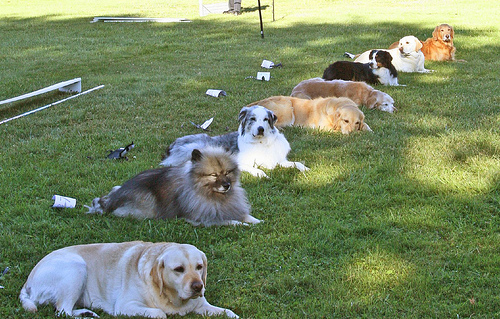This article is written so that you might know and understand all about the different ways to train your dog.
The more you look into it the more you will come to discover that there are many and varied forms of dog training, so the question will arise in your mind as to which is the best for you, and your dog.
Most dog owners and also people in general are unaware of the various kinds of dog trainings provided. The types of dog training change with the varying stages of development in the dog.
Perhaps your dog has already had some training, then again maybe they have not had any at all. This must be taken into account when you look into your dogs training needs.
The basic level of training, the first level, is for beginners - puppies, and those older dogs who are being introduced into training for the first time. As the name implies, your dog will learn the basic things such as when to sit, or when to stay, and when to come when called. Its quite elementary, but vital.
The next level is the intermediate level. This level of dog training is not for puppies, but for those adult dogs that have undertaken the basics either formally or at home by their own owners. This intermediate type of training trains a dog to heel, walk properly on a leash, fetch something and return. It also revises the basics of sitting, staying and coming etc.
The third and final type of dog training is the advanced course. This level is only meant for those dogs which have been through a minimum of one training course before and have passed it too. Here, in the advanced level, the different elements of the basic and intermediate courses are revised in detail right at the start of the course. Then it goes on to train the dog to act according to various commands and hand signals like come, stay, sit, heel, fetch, lie down et al.
Once your dog is comfortable with responding to hand signals then you can move on to teaching your dog how to walk beside you without being on the leash. The training will also teach your dog how to pay attention to you, and not be distracted by other people or dogs that they might see whilst out walking. This of course is indeed advanced training and hence it is only suitable for obedient and well behaved dogs.
A lot has been written about using incentives when training your dog, and I have to say that I am all in favour of it. A small reward can pay you big dividends. I am most certainly against shouting or even hitting your dog when they don't get it right. We all have to learn, and the reward system works best, and will bring you the positive results that you want.
So in conclusion let me just say that great care must be taken over the choice of course which is best for your dog. Talk through with the trainer all the details before you enrol and this way you will make sure that you end up with a dog whose behaviour you can be proud of.

 Dogs Play at the Park
Dogs Play at the Park
Dogs Play at the Park
Dogs Play at the Park
 Dog Dudes: Surfing Dogs
Dog Dudes: Surfing Dogs
Dog Dudes: Surfing Dogs
Dog Dudes: Surfing Dogs
 City Slickers: 5 Tips for Urban Living with Cats & Dogs
City Slickers: 5 Tips for Urban Living with C
City Slickers: 5 Tips for Urban Living with Cats & Dogs
City Slickers: 5 Tips for Urban Living with C
 Does Your Dog Need More Exercise?
Does Your Dog Need More Exercise?
Does Your Dog Need More Exercise?
Does Your Dog Need More Exercise?
 Canine Manners 101: Teaching your dog the basics of the 揝tay?Command
Teach Your Dog The "Stay" Command
Teaching your
Canine Manners 101: Teaching your dog the basics of the 揝tay?Command
Teach Your Dog The "Stay" Command
Teaching your